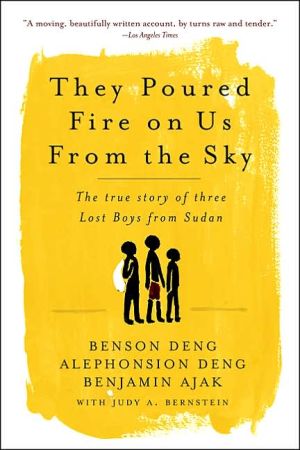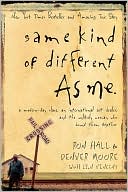They Poured Fire on Us from the Sky: The True Story of Three Lost Boys from Sudan
Benjamin, Alepho, and Benson were raised among the Dinka tribe of Sudan. Their world was an insulated, close-knit community of grass-roofed cottages, cattle herders, and tribal councils. The lions and pythons that prowled beyond the village fences were the greatest threat they knew.\ All that changed the night the government-armed Murahiliin began attacking their villages. Amid the chaos, screams, conflagration, and gunfire, five-year-old Benson and seven-year-old Benjamin fled into the dark...
Search in google:
They were all under the age of seven when they were driven from a war-ravaged country. In this deceptively understated memoir, three boys recall in their own words their harrowing journey to safety. Emily Wax Washington Post Book World 8/21/05 "In this tender and lyrical story, the world of... Africa's most desperate children-running away from war...is vividly evoked."
\ Emily Wax Washington Post Book World 8/21/05"In this tender and lyrical story, the world of... Africa's most desperate children-running away from war...is vividly evoked."\ \ \ \ \ Publishers WeeklyRaised by Sudan's Dinka tribe, the Deng brothers and their cousin Benjamin were all under the age of seven when they left their homes after terrifying attacks on their villages during the Sudanese civil war. In 2001, the three were relocated to the U.S. from Kenya's Kakuma refugee camp as part of an international refugee relief program. Arriving in this country, they immediately began to fill composition books with the memoirs of chaos and culture shock collected here. Well written, often poetic essays by Benson, Alepho and Benjamin, who are now San Diego residents in their mid-20s, are arranged in alternating chapters and recall their childhood experiences, their treacherous trek and their education in the camp ("People were learning under trees"). Other pieces remember the rampant disease and famine among refugees, and the tremendous hardship of day-to-day living ("Refugee life was like being devoured by wild animals"). When the boys arrived in America, Benson, upon seeing a Wal-Mart for the first time, remarked, "This is like a king's palace." Although some readers may wish for more commentary on what life in America is like for these transplants, this collection is moving in its depictions of unbelievable courage. Agent, Joni Evans at William Morris. (June 13) Copyright 2005 Reed Business Information.\ \ \ Kirkus ReviewsThree "lost boys" of Sudan remember lives lived far away from the torrents of history. The boys, now young men in their mid-20s, were members of the Dinka tribe, pastoralists who live in the south of the Sudan. The Dinka and their Nuer cousins, whom Benson Deng characterizes as "the tallest and blackest people in Africa," excited much jealousy among the Arab rulers of the Sudan-rulers who, by Deng's account, wanted the fertile lands between the Blue Nile and White Nile for themselves and, in the bargain, demanded that the Dinka convert to Islam. It was not an attractive offer; "as cattle keepers," Benson adds, "we didn't have time to be meditating with the Qu'ran five times a day." Soon government planes came to bomb Dinka villages whose inhabitants tried to fight back with spears; when better-armed rebel soldiers arrived, they guided the survivors to refugee camps in Ethiopia, where, Benson recounts, food and medicine were in constant shortage and "many of the boys got sick and died from eating grass soups, but it was often all we had." Over the next decade, the boys moved among refugee and rebel camps in Kenya and along the Sudanese border, a life that, Alephonsion writes, "was like being devoured by wild animals." That was little better than being one of the rebel soldiers, Benson adds: Once they strapped on AK-47s, they were controlled as tightly as dogs and sent off to die. Finally, their plight to come to the attention of international relief organizations, and thereafter private American efforts, brought the three boys to the U.S., "the land of many gorgeous goods" and of promises that, one hopes, are being kept. Well-meaning, and valuable as a document of the refugee experience.The boys' narrative, however, would have been better served by a commentary explaining the ongoing Sudanese crisis and otherwise adding more depth to this child's-eye view of events.\ \








